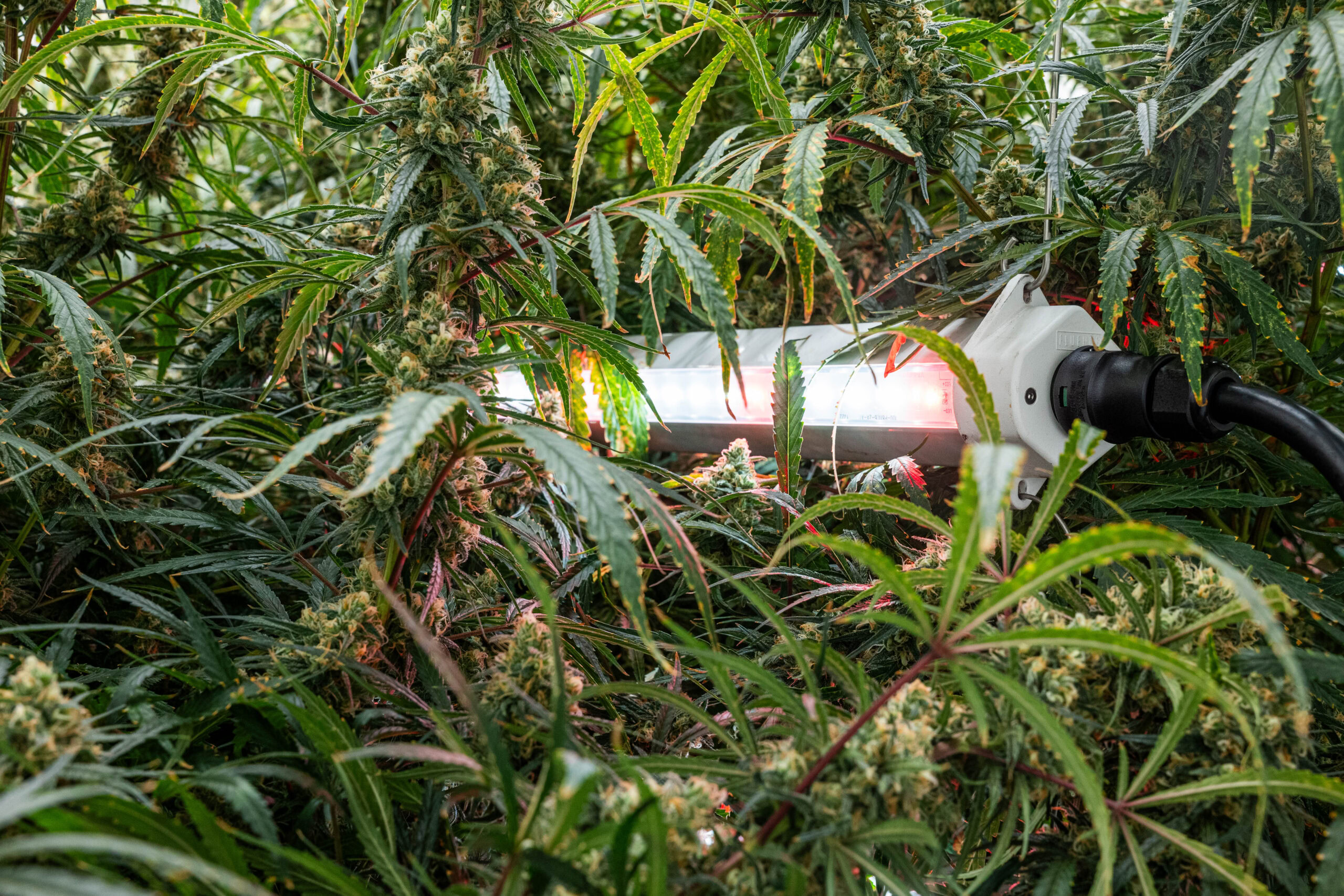
03 Jun Revolutionizing Cannabis Cultivation with Intercanopy Lighting
With respect to light tolerance and utilization, cannabis behaves more like a field crop than a horticultural crop. There is an abundance of evidence from commercial operations, grower participatory trials, and research projects showing that cannabis can produce a positive yield response to daily light integrals in excess of 60 mol·m-2·day-1 (1800 mol·m-2·day-1 for 12 hours). However, that same evidence reveals a strong interaction with cultivar. Some cannabis varieties respond in a near linear fashion to increasing light delivery at just about any light intensity; whereas others begin to show diminishing returns and even yield loss. Furthermore, some cultivars demonstrate phenotypic responses to light that are independent of yield response. In other words, a plant may continue to yield more biomass as light delivery is increased, but the morphology of that flower becomes undesirable. This can manifest itself as re-vegging, fox tailing, or changes in color.
On the other hand, most cannabis plants have undesirable reactions to low intensity light. Light quality and intensity at individual flowering sites are determining factors of the size and density of individual buds. The modified leaves that form cannabis inflorescences are photosynthetically active, so the best growth is achieved by enabling the flowers to power their own development. Additionally, cannabis inflorescences respond to light in much the same way as the rest of the plant: by stretching. Thus, low light intensities result in small, loosely packed inflorescences.

Plant responses to light are highly localized. In a typical top light setup, the intensity of light is much greater at the top of the plant than in the middle or bottom of the canopy. Using high top light fluxes to promote lower bud development can induce undesirable responses in the upper colas, whereas lower top light fluxes leave lower buds poorly developed. Much of cannabis cultivation centers around managing canopies to maximize light penetration into the lower branches to achieve a more homogenous crop.
Intercanopy lighting (ICL) provides a work around to these issues by moving light directly into the lower canopy where photosynthetic tissues are underutilized. In so doing, flower development in the lower canopy is accelerated. Growing cannabis with ICL leads to more A-grade buds and less trim waste, increasing the value of a given harvest by enriching the most valuable fraction. Furthermore, ICL provides a path for increasing yields by adding more light without risking negative responses from the top colas or having to make alterations to existing top lighting installations.
VYNE, the intercanopy lighting fixture developed by Fluence, is a proven tool for growers looking to improve yields and fruit and flower quality in the lower canopy where light levels are often low. If you are cannabis grower looking for a way to increase your yield, produce more A grade bud and eliminate wasteful larf, the VYNE intercanopy lighting solution could be the next best addition to your cultivation facility. With the addition of VYNE to an existing LED top light installation, yield increases of 20% or more can be achieved. Another place for VYNE is in low-tech greenhouses or outdoor sun grown crops where there are power restrictions. VYNE is a great option for supplemental lighting in these applications due to its extremely efficient design.

Taylor Kirk
Horticulture Service Specialist
Taylor Kirk is a horticulture service specialist for Fluence, the global leader in LED horticultural lighting, where he provides expert cultivation advice to the company’s cannabis growing partners and collaborates with researchers and other cannabis industry leaders. He has more than twenty years of experience in agriculture and a bachelor’s degree in agronomy from Texas A&M University. Taylor is also the founder of 4K Pharm LLC, a licensed Texas hemp producer, nursery, manufacturer and distributor.

Jason Matlock
Horticulture Service Specialist
10+ years of experience in the cannabis industry including commercial scale cultivation, facility design and construction, and business development consultation. Able to integrate and balance economic, logistical, and horticultural considerations when addressing operational challenges. Proven record of success with designing and conducting grower-participatory on-farm research trials. Capable of performing statistical analyses on biological datasets and presenting results in easily interpretable formats.


